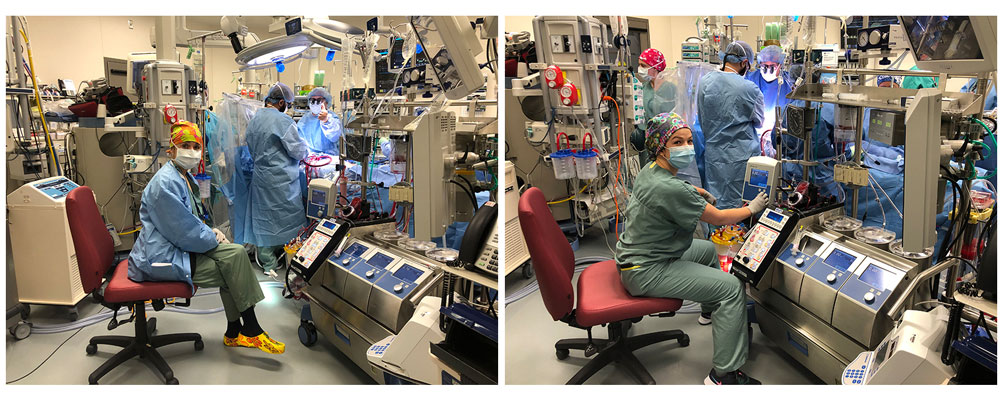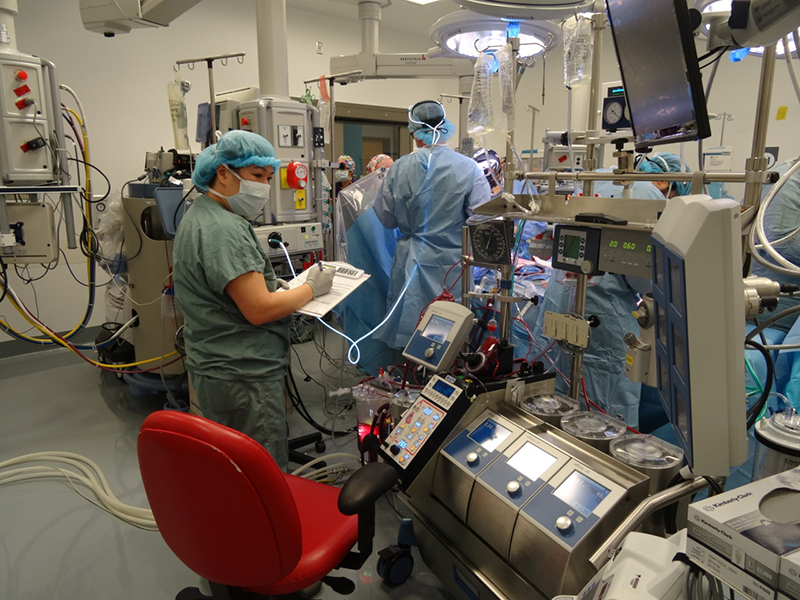Profession: Perfusionist
France Denis and Jeanne Corriveau, both perfusionists at the McGill University Health Center (MUHC), tell this anecdote with humour: "People don't know what a perfusionist is. They make us repeat, percussionists, perfumists? We still have to explain what we do," they say with a smile.
It must be said that training in cardiovascular perfusion is only offered at only three academic institutions in Canada, in Montreal, Toronto and Vancouver. The Université de Montréal has been offering this Specialized Graduate Diploma at the master's level since 2016. Jeanne Corriveau, is part of the first cohort to graduate: "After doing a bachelor's degree in biomedical sciences, which normally leads to research, I opted for this small and very specific branch that is cardiovascular perfusion. "
For France Denis, a perfusionist since the early 1980s, the evolution of the profession continues to fuel her interest: "After all these years at the bedside of patients, I still have a burning desire. The gestures we perform, the delegated acts, the technological equipment, for us it's a vocation. "
There are eighty perfusionists in Quebec, and recruitment challenges are numerous. But what exactly do perfusionists do?
Perfusion professionals are responsible for, among other things, keeping the heart working during cardiac surgery: "To allow the surgeon to perform a bypass operation or replace a heart valve," Jeanne Corriveau explains, "the blood flow must be redirected into heart-lung machine, in order to maintain the patient's vital functions during the operation. "
France Denis, adds: " In the operating room, our activities have diversified notably in vascular, thoracic and general surgery, as well as in traumatology, obstetrics and oncology. Inter-hospital travel is sometimes required. We provide vital support to hemodynamic and emergency room patients as well as those hospitalized in the intensive care unit. Over the years, the scope of our profession has expanded considerably," she explains.

Being a perfusionist during a pandemic
COVID-19 in 2020 has not been easy for perfusionists. In addition to maintaining the usual clinical activities and follow-ups with patients with mechanical hearts," continues France Denis, "we had a new group of patients to support: COVID ones, who were refractory to conventional treatments and mechanical ventilation. "
For these patients, ECMO (extracorporeal membrane oxygenation), a device that temporarily replaces a patient's heart and lungs, is a last resort option. “ECMO saves an average of one in two patients from death, which is already an improvement," says Jeanne. "We'd like to save them all, but unfortunately it's not always possible.
During the two waves of COVID-19, at the end of February, more than thirty COVID-19 patients had benefited from ECMO treatment, under the constant supervision of the perfusionists.
Beyond the impressive equipment: the patients
As sophisticated as the technological equipment used by the perfusionists may be, the two professionals never forget the human nature of their role: "Recently, I took care of a patient my age who was put on ECMO," recalls Jeanne, 28. It's rare, but he was extubated and communicating with us. We accompanied him to his heart transplant, which was a beautiful moment. "
On the other hand, perfusionists may be called upon to participate in a patient's end-of-life care: "It's not always easy," says France. You have to learn to deal with it. Fortunately, our great team spirit allows us to find comfort and get through it. "
Antoinette Dire, Director of Multidisciplinary Services, Adult Sites, has nothing but praise for all MUHC perfusionists. " They show solidarity in all circumstances. May Tam, as coordinator, does an exemplary job of overcoming challenges and providing high-quality care. I am honoured to work with everyone on this wonderful and very dedicated team. "

